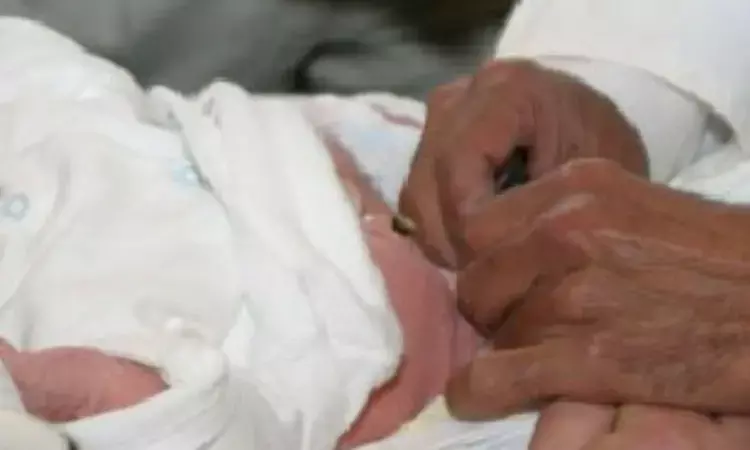- Home
- Medical news & Guidelines
- Anesthesiology
- Cardiology and CTVS
- Critical Care
- Dentistry
- Dermatology
- Diabetes and Endocrinology
- ENT
- Gastroenterology
- Medicine
- Nephrology
- Neurology
- Obstretics-Gynaecology
- Oncology
- Ophthalmology
- Orthopaedics
- Pediatrics-Neonatology
- Psychiatry
- Pulmonology
- Radiology
- Surgery
- Urology
- Laboratory Medicine
- Diet
- Nursing
- Paramedical
- Physiotherapy
- Health news
- Fact Check
- Bone Health Fact Check
- Brain Health Fact Check
- Cancer Related Fact Check
- Child Care Fact Check
- Dental and oral health fact check
- Diabetes and metabolic health fact check
- Diet and Nutrition Fact Check
- Eye and ENT Care Fact Check
- Fitness fact check
- Gut health fact check
- Heart health fact check
- Kidney health fact check
- Medical education fact check
- Men's health fact check
- Respiratory fact check
- Skin and hair care fact check
- Vaccine and Immunization fact check
- Women's health fact check
- AYUSH
- State News
- Andaman and Nicobar Islands
- Andhra Pradesh
- Arunachal Pradesh
- Assam
- Bihar
- Chandigarh
- Chattisgarh
- Dadra and Nagar Haveli
- Daman and Diu
- Delhi
- Goa
- Gujarat
- Haryana
- Himachal Pradesh
- Jammu & Kashmir
- Jharkhand
- Karnataka
- Kerala
- Ladakh
- Lakshadweep
- Madhya Pradesh
- Maharashtra
- Manipur
- Meghalaya
- Mizoram
- Nagaland
- Odisha
- Puducherry
- Punjab
- Rajasthan
- Sikkim
- Tamil Nadu
- Telangana
- Tripura
- Uttar Pradesh
- Uttrakhand
- West Bengal
- Medical Education
- Industry
Circumcision reduces risk of febrile UTI in boys with posterior urethral valves: Study

France: Results from the CIRCUP randomized trial have suggested that circumcision significantly decreases the risk of febrile UTI (fUTI) in boys with posterior urethral valves (PUVs). The findings, published in the journal European Urology, imply that circumcision should be considered routinely in such populations to reduce the likelihood of fUTI.
Boys with PUVs are known to be at increased risk of febrile urinary tract infections and circumcision is believed to reduce this risk. Although, no randomized trials have demonstrated this. To fill this knowledge gap, Luke Harper, Department of Pediatric Surgery, CHU de La Réunion, Saint-Denis de La Réunion, France, and colleagues aimed to determine the effect of circumcision on the risk of fUTIs in boys with PUVs.
For this purpose, the researchers designed a clinical randomized trial that ran between August 2012 and July 2017. The trial was multicentric conducted across 13 referral centers for pediatric urology. It included male boys, aged 1–28 d, diagnosed with posterior urethral valves, confirmed by voiding cystogram. Those with genital malformation contraindicating performing a circumcision were excluded.
Participants were randomized to neonatal circumcision + antibiotic prophylaxis (CATB) or antibiotic prophylaxis alone (ATB) and followed for 2 yr. In total, 91 patients were included: 49 in group CATB and 42 in group ATB.
The primary outcome was a risk of presenting fUTIs in each group. An fUTI was defined as fever (>38.5 °C) with evidence of pyuria and culture-proven infection on urinalysis, obtained by urethral catheterization or suprapubic aspiration.
Key findings include:
- The probability of presenting an fUTI was 20% in group ATB versus 3% in group CATB.
- The hazard ratio of presenting an fUTI within 2 yr in the ATB group compared with that in the CATB group was 10.3.
- Sixty-four children (70.3%) had a complete follow-up at 2 yr of age.
"We found that those who had a circumcision had a significantly lower risk of febrile UTIs," the researchers concluded.
Reference:
Luke Harper, T. Blanc, M. Peycelon, J.L. Michel, M.D. Leclair, S. Garnier, V. Flaum, A.P. Arnaud, T. Merrot, E. Dobremez, A. Faure, L. Fourcade, M.L. Poli-Merol, Y. Chaussy, O. Dunand, F. Collin, L. Huiart, C. Ferdynus, F. Sauvat, Circumcision and Risk of Febrile Urinary Tract Infection in Boys with Posterior Urethral Valves: Result of the CIRCUP Randomized Trial, European Urology, 2021, ISSN 0302-2838, https://doi.org/10.1016/j.eururo.2021.08.024. (https://www.sciencedirect.com/science/article/pii/S030228382101993X)
Meghna A Singhania is the founder and Editor-in-Chief at Medical Dialogues. An Economics graduate from Delhi University and a post graduate from London School of Economics and Political Science, her key research interest lies in health economics, and policy making in health and medical sector in the country. She is a member of the Association of Healthcare Journalists. She can be contacted at meghna@medicaldialogues.in. Contact no. 011-43720751
Dr Kamal Kant Kohli-MBBS, DTCD- a chest specialist with more than 30 years of practice and a flair for writing clinical articles, Dr Kamal Kant Kohli joined Medical Dialogues as a Chief Editor of Medical News. Besides writing articles, as an editor, he proofreads and verifies all the medical content published on Medical Dialogues including those coming from journals, studies,medical conferences,guidelines etc. Email: drkohli@medicaldialogues.in. Contact no. 011-43720751


